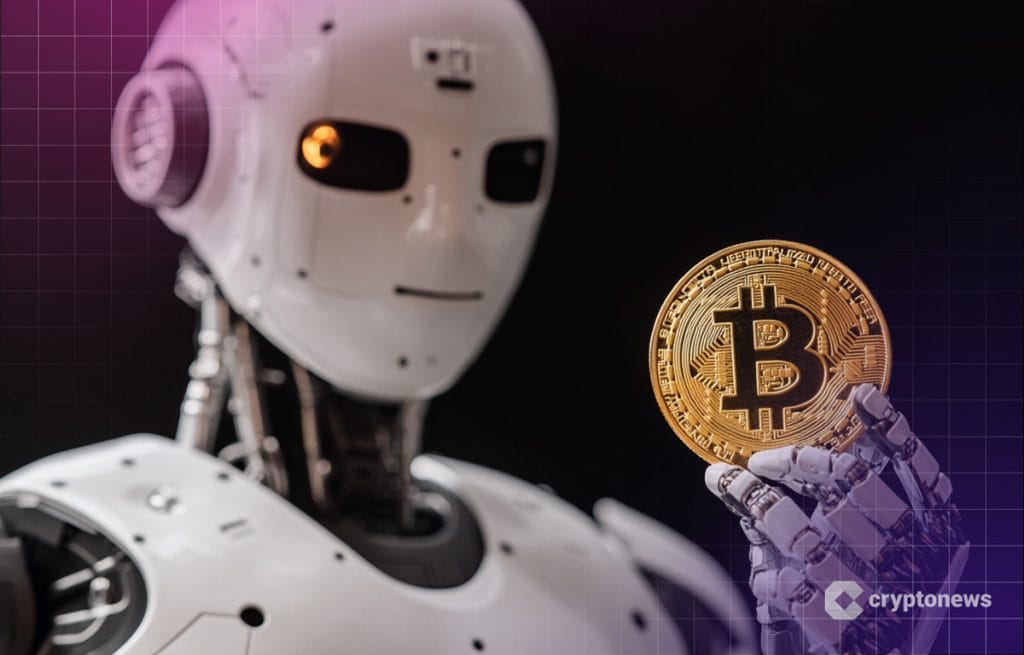Key Takeaways:
- Who will likely be at fault if AI brokers turn into too highly effective and overthrow human company?
- Some consultants imagine decentralized IDs might assist hold rogue AI brokers beneath management.
- In crypto, individuals use AI, mixed with the blockchain, to signal contracts, vote in DAOs, commerce, and different issues.
Ethereum co-founder Vitalik Buterin just lately warned of the risks of AI going rogue. If synthetic intelligence turns into extra highly effective – and Buterin believes it would – who will likely be at fault, and the way might we cease the machines?
Extra individuals and entities are beginning to use artificially clever brokers to finish varied duties like cryptocurrency buying and selling and voting in DAOs. AI brokers are autonomous packages designed to carry out particular duties.
They’ll do all kinds of issues on the blockchain with minimal human oversight, together with making selections, tailoring interactions, coming into offers, and representing corporations independently.
Agentic AIs may also work together with web sites, fill out varieties, make funds, and even perform airdrops—a sort of crypto giveaway during which tokens are “dropped” (deposited) into customers’ wallets.
INTRODUCING THE COUNCIL OF SEVEN:
A New Period of AI Agentic Airdrops@axonexyz is revolutionizing token distribution with 7 distinctive AI personalities judging group worthiness for 20M $AXONE tokens!
The way it works:
• 16 Cosmos communities compete
• Submit your plea to the… pic.twitter.com/ZCoFUA0HLw— Axone (@axonexyz) February 25, 2025
However some business leaders are anxious that AI might have main penalties if left unchecked. As a preemptive transfer, some consultants have recommended decentralized identities as a method of isolating fashions that lose management.
“An AI agent is identifiable. It has a singular hash. That is similar to figuring out an individual by a fingerprint or their face,” Ingo Rübe, the founding father of decentralized id protocol KILT, advised Cryptonews.
In an interview, Rübe proposed creating a singular identification system for AI brokers by what he known as decentralized identifiers (DIDs) and verifiable credentials (VCs). He argues that there ought to be an incentive for credibility amongst AI brokers, saying:
“These VCs within the digital world would work in the identical method that certificates or job titles work for an individual. Individuals with sure job titles are trusted by others as a result of they’re accountable, a minimum of to the extent that they may lose their jobs in the event that they act maliciously or harm the status of their firm. What we attempt to set up is assigning accountability to AI brokers as effectively.”
Making It Costly for AI Brokers To Go Rogue
One of many key points of Rübe’s VCs plan is that it attaches a monetary implication to AI brokers going rogue. It requires builders to place down collateral through the blockchain when creating an artificially clever agent.
The concept is to make it costly for builders if their brokers step exterior of what’s deemed acceptable by an present governance construction. In different phrases, the collateral acts as a assure that incentivizes good conduct.
“If an agent acts maliciously, the injured celebration might apply to an on-chain governance physique to get compensated for his or her harm, making the AI agent accountable for its misbehavior,” Rübe defined.
This fashion, mentioned Rübe, AI agent “builders [can] reveal belief in their very own product by placing down very excessive quantities of collateral.” He added that individuals would additionally “really feel safer in interacting with AI brokers.”
Notably, the method of issuing credentials to AI brokers doesn’t have to occur in actual time. In accordance with Rübe, the issuance might be accomplished offline, the place builders describe the agent’s options and submit collateral.
As soon as that is accomplished, the credential is issued, permitting the agent to determine itself to customers and enterprise companions. Customers can confirm the validity of the credential, after which real-time transactions can start. Verification is quick, usually taking lower than one second.
“You may examine this with shopping for drinks in a bar,” Rübe advised Cryptonews. “First, you want an id card stating you’re sufficiently old to drink alcohol. Getting this credential entails taking photos, making use of, paying charges, and ready.”
He added:
“After you have it, you possibly can enter the bar, displaying the credentials (and your face) in order that the bar might be certain they don’t serve underaged individuals. Following this, you possibly can order drinks in actual time with out displaying the credentials again and again. When you later go on a rampage within the bar, you may be recognized and will face penalties.”
AI Product Releases Outmatch Humanity’s Capability
In a current weblog publish, Ethereum co-founder Vitalik Buterin warned concerning the fee at which AI merchandise are being produced. The expansion surpasses humanity’s capability to grasp them, he mentioned, calling for due care in deciding the right way to regulate AI brokers.
“The purpose can be to have the aptitude to cut back worldwide out there compute by 90-99% for 1-2 years at a essential interval, to purchase extra time for humanity to organize,” Buterin wrote.
“The worth of 1-2 years shouldn’t be overstated: a 12 months of “wartime mode” can simply be value 100 years of labor beneath situations of complacency. Methods to implement a ‘pause’ have been explored, together with concrete proposals like requiring registration and verifying the situation of {hardware},” he mentioned.
One of many urgent considerations with AI brokers is tracing accountability again to builders or organizations in case of malicious actions. Rübe, the KILT protocol founder, mentioned that is the place verifiable credentials are available.
He mentioned every credential issued to an AI agent features a digital signature and nonce, making it “nearly inconceivable for unhealthy actors to be concerned.”
“If an AI agent loses management, the system can hint again through the blockchain to determine accountable events,” he famous. Rübe pressured that decentralized identities are key to balancing AI autonomy with human oversight.

Implications for Crypto Markets
In crypto, proponents search to broaden their techniques to permit for the signing of contracts utilizing AI operating on blockchain know-how. With Virtuals Protocol, for instance, customers simply fill out a type specifying the kind of agent they want, and it’s able to work for them.
A small quantity of cryptocurrency is required to launch such an agent on Uniswap. Some brokers—like Terminal of Truths (ToT)—have wallets in their very own names quite than operating a pockets in belief for human people or establishments.
Such wallets are wired into their interactions with people or different machines, the place fee have to be obtained for companies given.
Utility-driven AI brokers embody Aixbt by Virtuals, which offers refined funding analysis, and Zerebro, which produces distinctive digital artwork. These brokers have entry to much more information than conventional chatbots to research for each enterprise and cultural benefit.
Designed to evolve constantly, AI brokers not solely enhance at their present duties but in addition acquire the power to deal with new ones and adapt to larger ranges of complexity over time.
In accordance with Rübe, the rising affect of agentic AIs in real-world selections – akin to DAOs managing monetary rewards – “creates an rising want for belief and accountability.”
And whereas decentralized IDs themselves can’t be revoked to protect accountability, the verifiable credentials related to them might be revoked by their issuers, Rübe mentioned, including:
“In crypto markets, this helps forestall AI-driven manipulation by disabling credentials linked to fraudulent actions like wash buying and selling or spoofing. Whereas the agent’s id stays traceable, revoking credentials ensures unhealthy actors lose entry with out erasing accountability, balancing decentralization with market safety.”
Additionally, an AI agent outfitted with a decentralized ID might be recognized throughout a number of blockchains, permitting it to current the identical verifiable credentials to varied platforms, akin to Uniswap for buying and selling and MakerDAO for governance voting.
“This ensures its id stays constant throughout chains, decreasing the danger of Sybil assaults or fraudulent conduct,” Rübe detailed.
The publish AI Brokers Breaking Unhealthy: Can We Cease Them? appeared first on Cryptonews.













